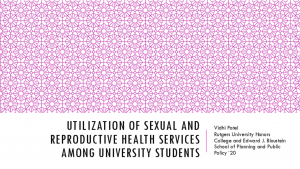Patel, Vidhi: Utilization of Sexual and Reproductive Health Services among University Students
Title: Utilization of Sexual and Reproductive Health Services among University Students
Name: Vidhi Patel
Major: Public Health
School affiliation: Honors College, School of Arts and Sciences
Programs: Honors College Capstone
Other contributors: Francis Barchi
Abstract: Sexual and reproductive health (SRH) is an important aspect of general health and wellness for all post-adolescents. Specifically, college students are at a unique period of their lives in which they are beginning to have independence and make informed decisions about their health, and for many, sexual health is often considered for the first time. SRH outcomes, in this age group, such as sexually transmitted infections (STIs) and unplanned pregnancies are disproportionately high compared to other sexually active groups, such as older adults. College students’ unique environment of both independence and reliance can either encourage self-sufficiency or lead to isolation and lack of communication.
Current studies on how this age group accesses SRH services have explored the rates of utilization of SRH resources in secondary schools in Ethiopia and colleges in Canada, but similar studies about post-adolescent populations in the United States have been limited.
This study used a self-administered questionnaire to investigate associations and trends between specific demographic groups and their accessing of SRH services while a student at Rutgers—New Brunswick. Demographic data was collected as well as information on their knowledge, attitudes, and behaviors related to accessing SRH care services.
Results showed that 42% of respondents have not accessed SRH care at all. Of these, most were Asian-identified students. Half of these students were sexually active. Students were more likely to prefer private practitioners, especially women and sexually active students. Only 4% of respondents did not access care when they required it.
These results indicate that students are accessing care during times they need it, but there is still a significant portion of students that are not accessing SRH care at all. Students prioritize cost, location, and confidentiality. Rutgers Student Health services can use this information for future outreach efforts to increase awareness of the SRH care options available to students. Further research can be considered to expand the sample size and investigate trends in other demographic groups. Qualitative data can also be explored to gauge student attitudes about their SRH care options.
